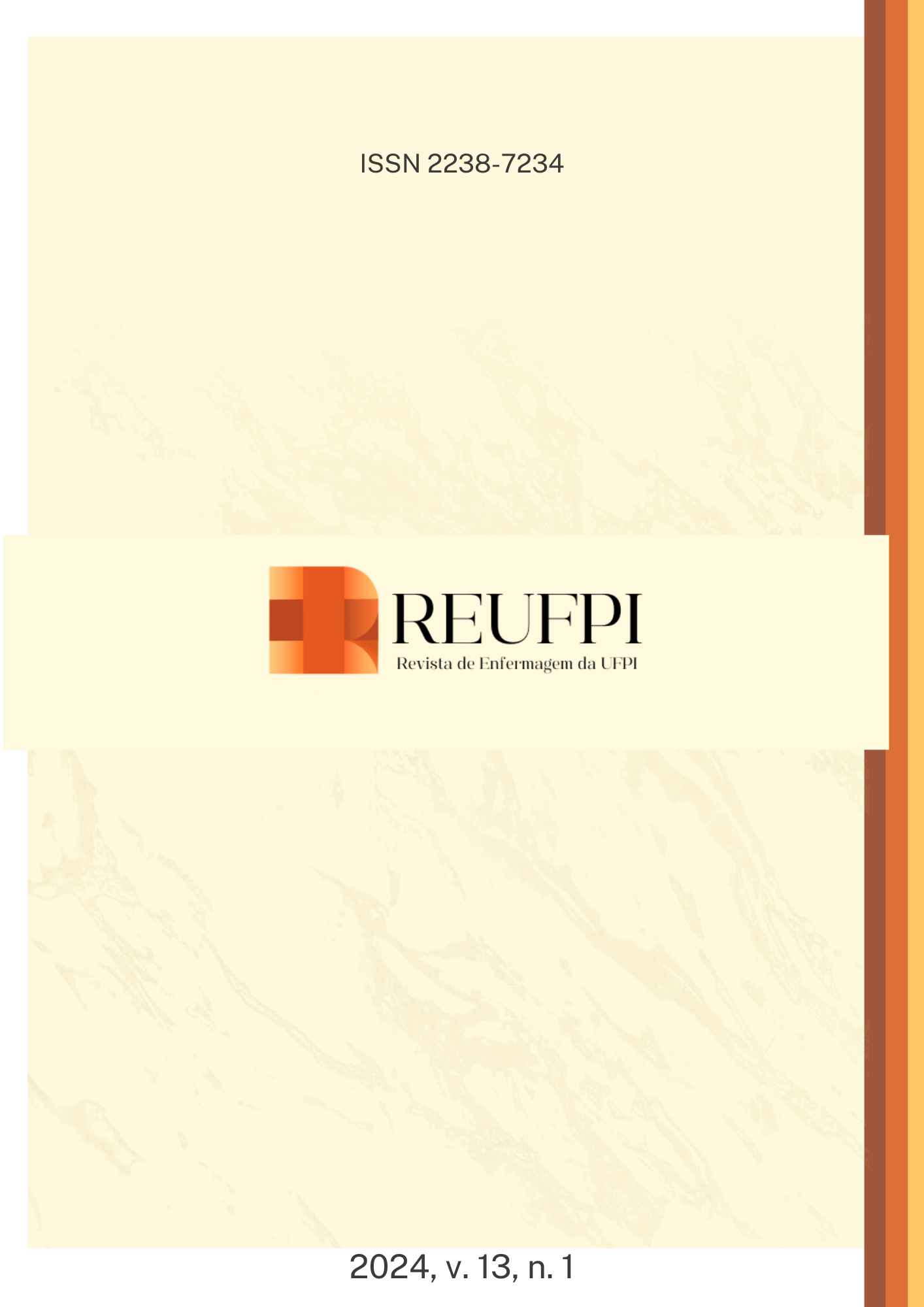Promoção da saúde mental à uma pessoa com transtorno afetivo bipolar: relato de experiência
DOI:
https://doi.org/10.26694/reufpi.v13i1.5037Palavras-chave:
Transtorno Bipolar; Promoção da Saúde; Saúde Mental; Teoria de Enfermagem; Enfermagem Psiquiátrica.Resumo
Objetivo: Relatar intervenção de promoção da saúde realizada a uma pessoa com Transtorno Afetivo Bipolar, à luz da Teoria Human Becoming e das competências de promoção da saúde do Consenso de Galway. Método: Estudo descritivo, do tipo relato de experiência, desenvolvido em janeiro de 2021, por acadêmicos de enfermagem da Universidade Estadual Vale do Acaraú junto a uma pessoa com Transtorno Afetivo Bipolar. A intervenção foi desenvolvida em quatro etapas conforme os domínios de competência de promoção da saúde do Consenso de Galway e os princípios da Teoria Human Becoming. Resultados: Na intervenção, foi possível identificar os significados, as repercussões biopsicossociais e as das principais necessidades de saúde do sujeito no enfrentamento ao transtorno bipolar. Por meio disso, desenvolveu-se quatro ações educativas, que objetivaram auxiliar o paciente a lidar com as dificuldades vivenciadas, a modificar seus hábitos de vida e a identificar medidas de cuidado para favorecer a melhora da saúde mental e do controle dos sintomas do transtorno. Conclusão: A intervenção reforça a importância de referenciais teóricos e competências de promoção da saúde no cuidado a pessoa com transtorno bipolar, haja vista que promovem uma abordagem inovadora, holística e humanizada para favorecer a reabilitação e o autocuidado do sujeito.
Referências
Valeriano MG, Alegria R, Forlenza OV, Radanovic M. Discourse abilities in euthymic elderly patients with bipolar disorder: a preliminary study. Dement. neuropsychol. 2023;17:e20220067. https://doi.org/10.1590/1980-5764-DN-2022-0067
Elias AFD, Fagueiro CO, Silveira EAA, Pinto JAF, Aleluia Júnior JA, Machado RM. Bipolar affective disorder: healthsocial determinants, adherence to treatment and space distribution. Rev enferm UERJ. 2019;27:e43934. http://dx.doi.org/10.12957/reuerj.2019.43934
Moura HDS, Lira JAC, FerrazMMM, Lima CLS, Rocha ARC. Bipolar affective disorder: feelings, stigmas and limitations. Rev enferm UFPE online. 2019;13:e241665. https://doi.org/10.5205/1981-8963.2019.241665
Yatham LN, Kennedy SH, Parikh SV, Schaffer A, Bond DJ, Frey BN, et al. Canadian Network for Mood and Anxiety Treatments (CANMAT) and International Society for Bipolar Disorders (ISBD) 2018 guidelines for the management of patients with bipolar disorder. Bipolar Disord. 2018;20(2):97-170. https://doi.org/10.1111/bdi.12609
McIntyre RS, Alda M, Baldessarini RJ, Bauer M, Berk M, Correll CU, et al. The clinical characterization of the adult patient with bipolar disorder aimed at personalization of management. World Psychiatry. 2022;21(3):364-387. https://doi.org/10.1002/wps.20997
Jansen RC, Silva IC, Nogueira MRN, Oliveira VC, Cavalcanti MCSL, Barros LM. Art therapy in the promotion of mental health: an experience report. Rev Enferm UFPI. 2021;10:e805. https://doi.org/10.26694/reufpi.v10i1.805
Parse RR. Illuminations: the human becoming theory in practice and research. New York (EUA): Nactional League for Nursing; 1995.
Silva FVF, Silva LF, Guedes MVC, Moreira TMM, Rabelo ACS, Ponte KMA. Nursing care to people with hypertension based on Parse's theory. Esc Anna Nery. 2013Jan;17(1):111–9. https://doi.org/10.1590/S1414-81452013000100016
Barry MM, Allegrante JP, Lamarre MC, Auld ME, Taub A. The Galway Consensus Conference: international collaboration on the development of core competencies for health promotion and health education. Glob Health Promot. 2009 Jun;16(2):5-11. https://doi.org/10.1177/1757975909104097
Sousa VLP, Moreira ACA, Oliveira FES de, Magalhães Junior JWC. Nursing skills in the health promotion of elderly people with mental disorder. Rev. enferm. UERJ. 2019;27:e43242. https://doi.org/10.12957/reuerj.2019.43242
Singh V, Kumar A, Gupta S. Mental Health Prevention and Promotion - a narrative review. Front Psychiatry. 2022;13:898009. https://doi.org/10.3389/fpsyt.2022.898009
Miklowitz DJ, Efthimiou O, Furukawa TA, Scott J, McLaren R, Geddes JR, et al. Adjunctive psychotherapy for Bipolar Disorder: a systematic review and component network meta-analysis. JAMA Psychiatry. 2021;78(2):141-150. https://doi.org/10.1001/jamapsychiatry.2020.2993
Ferreira IMF, Barletta JB, Mansur-Alves M, Neufeld CB. From self-knowledge to self-concept: review on constructs and instruments for children and adolescents. Psicol Estud. 2022;27:e49076. https://doi.org/10.4025/psicolestud.v27i0.49076
Oliveira LS, Oliveira EN, Campos MP, Sobrinho NV, Aragão HL, França SS, et al. Music as a strategy for mental health promotion between university students. Saúde em Redes. 2019; 5(3):329341. https://doi.org/10.18310/2446-4813.2019v5n3p329-341
Ibiapina ARS, Lopes-Junior LC, Veloso LUP, Costa APC, Silva Júnior FJ, Sales JCs, et al. Effects of music therapy on anxiety and depression symptoms in adults diagnosed with mental disorders: a systematic review. Acta paul enferm. 2022;35:eAPE002212 https://doi.org/10.37689/acta-ape/2022AR02212
Rocha Filho PM, Ferreira JG, Santos JLC, Rocha SOSB, Lima EJS, Guterres AS. The importance of promoting Nutritional Education for patients with hospitalized mental disorders: a description of experience. Saúde em Redes. 2022;8(Sup2). https://doi.org/10.18310/2446-4813.2022v8nsup2p127-137
Rocamora-Montenegro M, Compañ-Gabucio LM, Garcia de la Hera M. Occupational therapy interventions for adults with severe mental illness: a scoping review. BMJ Open. 2021 Oct 29;11(10):e047467. https://doi.org/10.1136/bmjopen-2020-047467
Lessa Pires L, Oliveira M, Abreu L, Corrêa K. Mental health and physical activity level of physiotherapy residents during the covid-19 pandemic. Movimenta. 2021;14(3):890-0. https://doi.org/10.31668/movimenta.v14i3.11914
Downloads
Publicado
Como Citar
Edição
Seção
Licença
Copyright (c) 2024 Rev Enferm UFPI

Este trabalho está licenciado sob uma licença Creative Commons Attribution 4.0 International License.
Autores mantém os direitos autorais e concedem à REUFPI o direito de primeira publicação, com o trabalho licenciado sob a Licença Creative Commons Attibution BY 4.0 que permite o compartilhamento do trabalho com reconhecimento da autoria e publicação inicial nesta revista.

























